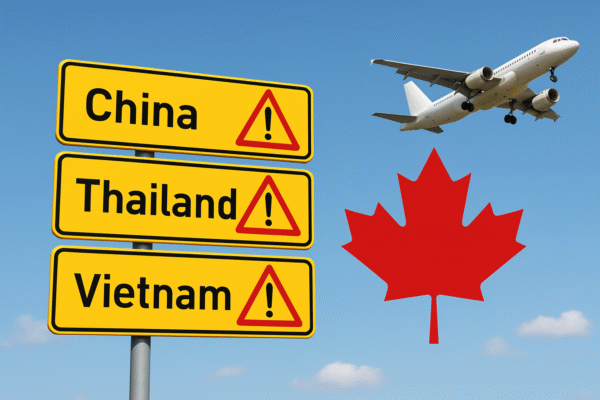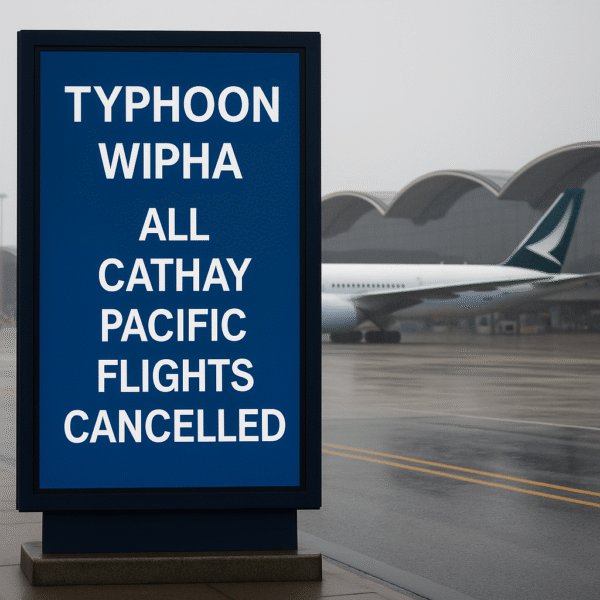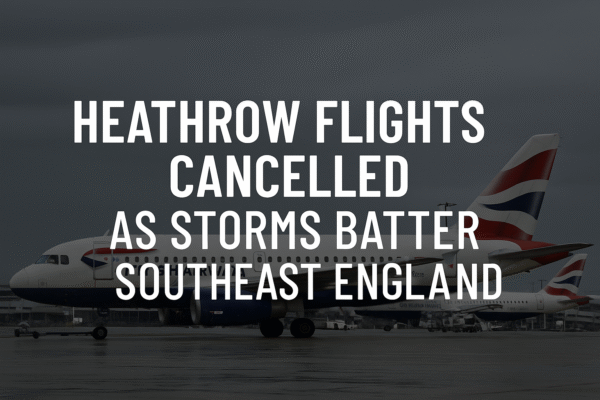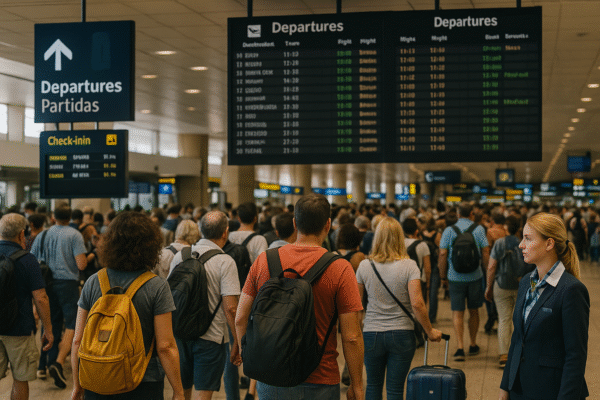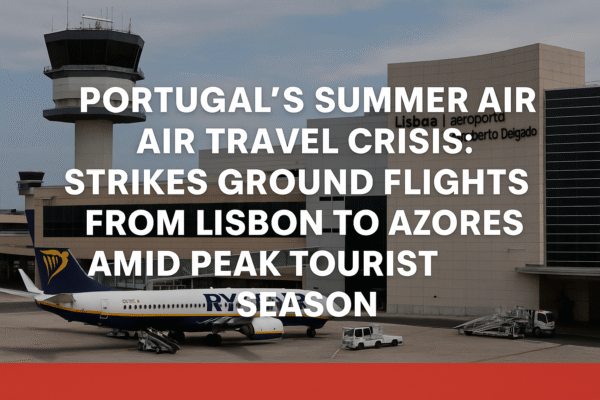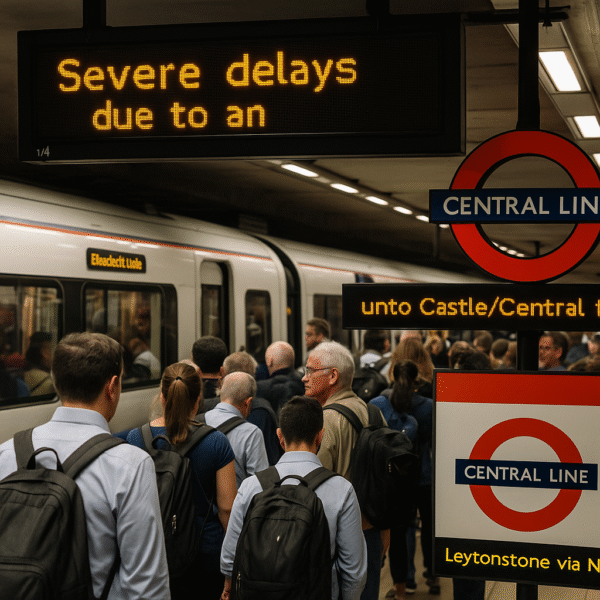As the peak summer season drives record tourist arrivals, Portugal is facing a crippling aviation crisis that threatens to paralyze its vital travel infrastructure. Simultaneous strikes by SPdH/Menzies ground handling staff and SATA Air Açores cabin crew have brought chaos to airports nationwide, including Lisbon, Porto, Faro, Funchal, and throughout the Azores archipelago.
The dual labor disputes, hitting just as thousands of holidaymakers descend upon the country’s sun-drenched coastlines and island retreats, have triggered flight delays, check-in disruptions, and the widespread cancellation of inter-island connections.
Ground Handling Strike Disrupts Mainland and Island Airports
Starting Friday, July 25 and continuing through Monday, July 28, ground operations at Portuguese airports are expected to suffer severe slowdowns. The four-day national strike, led by workers of SPdH/Menzies Aviation, impacts essential functions such as passenger check-in, baggage handling, ramp services, and aircraft cleaning.
Affected airports include Lisbon Humberto Delgado Airport, Porto Francisco Sá Carneiro, Faro International, Funchal’s Cristiano Ronaldo Madeira International, and Porto Santo. According to Portugal’s ANA Aeroportos, these airports handle millions of summer arrivals, with Lisbon alone processing over 30,000 passengers per day during July.
This walkout aims to spotlight demands for higher wages, improved work conditions, and better scheduling amid what unions claim is chronic understaffing and overwhelming workloads. “The system is broken,” said a union spokesperson. “Our members are working in high-stress environments with insufficient compensation during the busiest travel season.”
SATA Air Açores Cabin Crew Strike Grounds Inter-Island Travel
Compounding the disruption, SATA Air Açores cabin crew began a seven-day strike on Thursday, July 18, scheduled to last until Wednesday, July 24. With around 60 crew members participating, the walkout has drastically limited air services between the nine inhabited islands of the Azores.
SATA is the primary inter-island airline in the region, and its grounding leaves island communities—including Ponta Delgada, Horta, Terceira, and Flores—disconnected. With no comparable ferry infrastructure, the Azorean economy relies heavily on air links for daily commerce, medical access, and, especially in July, tourism.
Tourism businesses in the Azores now face dwindling arrivals and mounting cancellations, with guesthouses and tour operators reporting immediate revenue losses. “The ripple effects on the islands are devastating,” said an official from the Azorean Tourism Association. “We rely on a steady stream of visitors, especially now.”
A Perfect Storm During a Critical Travel Period
According to Turismo de Portugal, the country welcomed over 28 million international tourists in 2024—a record figure that set the stage for a strong 2025. But with strikes unfolding during the highest-traffic weeks of the year, travelers are facing hours-long airport queues, missed flights, and vacation cancellations.
Official statistics show a 21% increase in cruise and flight arrivals between January and May 2025 compared to the same period in 2024. This summer surge, fueled by strong inbound traffic from the UK, France, Germany, and the U.S., has placed enormous strain on Portugal’s aviation infrastructure.
Travel Advisory: What Passengers Should Know
Portugal’s National Civil Aviation Authority (ANAC) and the Directorate-General for Consumer Affairs have advised passengers to take proactive measures:
- Reconfirm all bookings and monitor real-time alerts from airlines.
- Arrive at airports early—three hours minimum for international flights.
- Consider travel insurance with disruption coverage.
- Explore alternate airports or connections where possible.
Airlines such as TAP Air Portugal, Ryanair, and easyJet have activated contingency protocols, including rescheduling flights, consolidating services, and offering refunds or free changes. Nevertheless, carriers warn that delays and cancellations may be unavoidable given the scale of the labor unrest.
Mediation Ongoing but No Resolution Yet
Despite ongoing negotiations between labor unions and management, no agreement has been reached. SPdH/Menzies workers are calling for salary adjustments in line with cost-of-living increases and safeguards against burnout. SATA’s cabin crew are pushing for reduced flight rosters, overtime compensation, and job security guarantees amid organizational restructuring.
While the Portuguese government has yet to intervene directly, Transport Minister Jorge Delgado stated that the situation is being monitored closely and contingency plans are in place. “We acknowledge the concerns of aviation professionals and hope for a swift resolution to restore full operational normalcy,” he said.
Tourism Industry Calls for Long-Term Reforms
Portugal’s tourism stakeholders are sounding the alarm on the fragility of the nation’s aviation system. As international arrivals continue to rise and dependence on air travel deepens—particularly in remote regions like the Azores—industry leaders are calling for greater investment in labor conditions, digital modernization of airport systems, and alternative transport links.
“In the medium to long term, we must strike a balance between tourism growth and operational resilience,” said Francisco Calheiros, President of the Portuguese Tourism Confederation. “Strikes like these are a warning sign. We cannot risk our global reputation as a top-tier travel destination.”
Conclusion: Crisis Highlights Need for Structural Change
As Portugal grapples with simultaneous strikes at the height of summer, the aviation meltdown has exposed deeper systemic vulnerabilities. What began as labor disputes has evolved into a national tourism emergency. While passengers endure airport chaos and the tourism sector counts its losses, it is clear that structural reform—not temporary fixes—will be necessary to secure the future of air travel in Portugal.
With the peak travel season still underway, how the country responds in the coming days will determine both the short-term success of its tourism recovery and the long-term resilience of its aviation infrastructure.
For more travel news like this, keep reading Global Travel Wire





